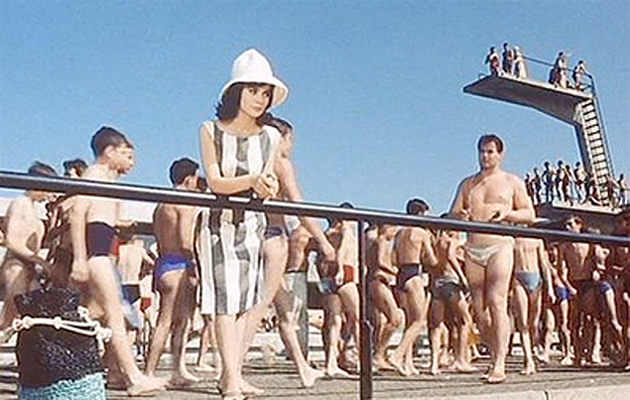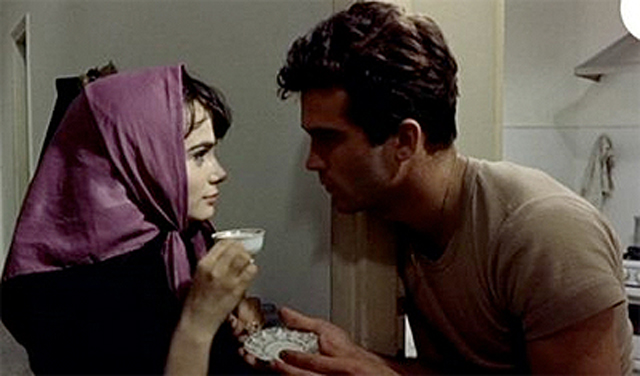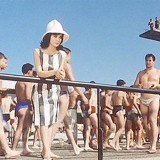With the global success of Fellini’s 1960 La Dolce Vita, Cinecitta’ the glorious studio in Rome continued the theme of love in modern times, featuring four leading directors: Mario Monicelli, Federico Fellini, Luchino Visconti and Vittorio de Sica. The last three were considered veterans back then, whereas Monicelli an up and coming director that his 1958 film I soliti ignoti – Big Deal in Madonna Street – is considered the first of the commedia all’italiana genre.
 Luciana waiting for Renzo in the packed swimming pool with the lurking boss approaching
Luciana waiting for Renzo in the packed swimming pool with the lurking boss approaching
The first film in this anthology of four, tells the story of Renzo (Germano Gilioli) and Luciana (Marisa Solinas) a young couple during the Italian economic boom of early ‘60’s. We initially see the couple at work under strain trying to hide the fact that they are engaged from their nosy boss out of fear of getting fired. The film attempts to show what could have been a millennial love story if shot today. New set of dilemmas that are in complete opposite to Italian traditional family mores. For example, the improvised marriage in a church that looks more like a Las Vegas instant marriage parlor than you would expect from an Italian church, the struggle of the couple for economic independence and once achieved – the grinding daily routine.
There are a couple of scenes I especially liked because of their unique visual value: the packed swimming pool with millions of people clad only in bathing suites – feels like a gigantic colony of wavering organisms painted in brown with patches of light blue pool waters. There is also the swiveling stage in the disco laden with couples dancing or better yet, the crowded movie theater where Luciana finally sighed in relief while hugging Renzo – finally some privacy…
Indeed, the theme of privacy is central to the plot, as the couple throughout the film is in search of this scarce commodity, but when they finally get it, it’s thrown aside due to more important pragmatic priorities like job security and planning for the future. And this quest is whimsically punctuated by Luciana’s occasional excitements: Che meraviglia! (how nice!).
 Glimpse of hope to relax on Sunday, as the couple negotiates their new responsibilities
Glimpse of hope to relax on Sunday, as the couple negotiates their new responsibilities
The soundtrack alternates between jazzy tune to convey the modern pace of life the couple leads that in turn changes into a more somber sax and organ interplay. The only ray of hope for the newly wed couple straining under their conflicting work routines is the poignant scene when Luciana hurriedly takes a tiny sip from her espresso Renzo offers before leaving to work and says:
Domenica, Domenica restiamo tutto al giorno in letto. Che Meraviglia! Ciao! (Sunday, Sunday we’ll stay all day in bed. How nice! Bye).
That’s the price of progress and the socio-urban face of post-war modern Italy.

